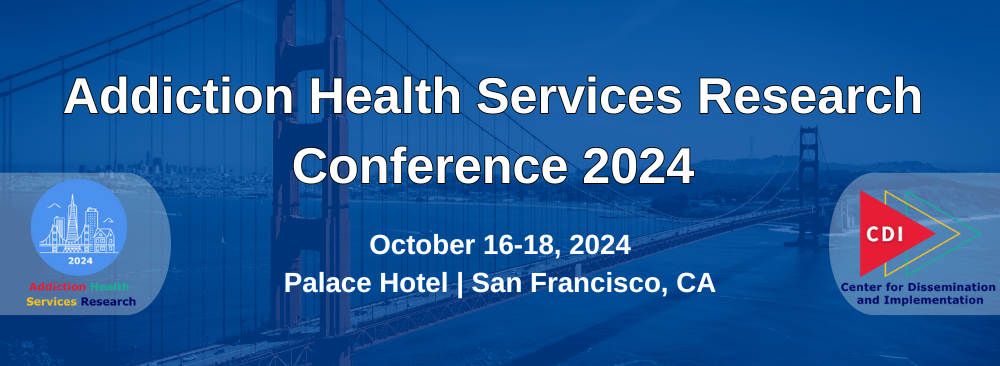The SPIRE Center at AHSR 2024
Many members of the SPIRE Center team will be attending and presenting at this year's Addiction Health Services Research Conference. Check out the following sessions and preconference workshop to learn more about our recent work.
Pre-Conference Workshop: Wednesday, Oct 16
"Opportunitites and Challenges in Applying Digital Health Technology for Addiction Health Services Research"
8:30-10:00 am
Speakers
- Alisa Busch, Chief Medical Information Officer, McLean Hospital
- Katharine Bradley, Senior Investigator, Kaiser Permanente Washington Health Research Institute
- Adam Gordon, Professor of Medicine and Psychiatry, University of Utah School of Medicine
- Tingting Liu, Research Fellow, Technology and Translational Research Unit, Translational Addiction Medicine Branch, National Institute on Drug Abuse
- Andrew Quanbeck, Associate Professor, Department of Family Medicine and Community Health, University of Wisconsin
Digital health technologies (such as electronic health records [EHRs] and health applications [“apps”]) offer new health services research opportunities to evaluate and improve the quality of addiction care. These opportunities include details of clinical information at the patient and population health level not available in claims data, and to tailor care to subsets of populations and evaluate outcomes. Further, there are opportunities for a wide range of research methodological skills sets—such as observational or randomized controlled design, computational data science, generative artificial intelligence (AI), software development, implementation science, and qualitative or mixed methods. But there are also important methodological challenges. For example, EHR adoption lags for behavioral health providers in general, and addiction providers in particular, in part due to the federal privacy law 42 CFR Part 2. Additionally, EHRs often contain incomplete and poor-quality data, with crucial clinical information embedded in notes, necessitating advanced computational techniques for extraction. Apps pose unique challenges—such as ensuring sustained patient engagement for outcomes measurement, and whether or how to integrate their use (and data) into routine care. Recent advancements in generative AI, combined with digital health technologies offer important opportunities to improve care but also pose challenges and concerns that need to be addressed to fully realize these benefits.
This 90-minute panel, which is sponsored by the Brandeis-Harvard NIDA P30 SPIRE Center, will include investigators experienced in using digital health technology in addiction health services research. They will discuss opportunities, challenges, and lessons learned. The moderator, Dr. Busch, will provide introductions and an initial overview (5-7 minutes). The moderator will then provide questions or prompts to the panel to generate a robust discussion among panelists. Audience questions and interaction will be encouraged.
Day 1: Wednesday, Oct 16
Scientific Breakout Session I3:15 - 4:30pm |
||
| Theme | Title | Presenter(s) |
|
Issues in Alcohol Use Disorder |
Prescribing practices among providers treating alcohol use disorder with medication |
Alene Kennedy-Hendricks, Dominic Hodgkin, Alisa Busch, Constance Horgan, Lori Uscher-Pines, Haiden Huskamp |
Poster Session I4:30 - 5:30pm |
||
| Theme | Title | Presenter(s) |
|
Health Disparities, Health Equity, & Racism |
Assessing Risk of Child Welfare System Involvement Among Families with Parental Substance Use |
Alene Kennedy-Hendricks Component Project PI |
| Access to Harm Reduction and Treatment Services Among People at Elevated Risk of Overdose: Findings from the VOICES Study |
Sachini Bandara SPIRE-IRI Fellow |
|
| Understanding Alcohol Use, Risky Use, Addiction and Treatment in the U.S. by Disability Status |
Sharon Reif Center Co-Director |
|
| Healthcare Systems & System-Wide Interventions |
Effectiveness of Washington State’s Hub and Spoke Model to Improve Six-Month Opioid Use Disorder Outcomes Among Medicaid Beneficiaries |
Sharon Reif Center Co-Director |
Day 2: Thursday, Oct 17
Scientific Breakout Session III10:45am - 12:00pm |
||
| Theme | Title | Presenter(s) |
| Telehealth & Telemedicine | The Role of Telemedicine in the Initiation of Medications for Alcohol Use Disorder |
Haiden Huskamp Center Co-Director |
Scientific Breakout Session IV2:45 - 4:00pm |
||
| Theme | Title | Presenter(s) |
| Implementation of MOUD Services | Differences in Implementation Quality for Medications for Opioid Use Disorder and Community Characteristics across Primary and Specialty Care Clinics |
Berkeley Franz SPIRE-IRI Fellow |
Scientific Breakout Session V4:15 - 5:30pm |
||
| Theme | Title | Presenter(s) |
| Pregnancy, Neonatal Care, and Reproductive Rights | The Implementation of State Policies Related to Plans of Safe Care and the Reporting of "Substance Exposed Newborns" to Child Welfare Agencies |
Sachini Bandara SPIRE-IRI Fellow |
Day 3: Friday, Oct 18
Scientific Breakout Session VI9:30 - 10:45am |
||
| Theme | Title | Presenter(s) |
| Innovative Approaches to Reach Minoritized Populations | The Implementation Climate for Integrating Buprenorphine Prescribing into Rural Primary Care |
Berkeley Franz SPIRE-IRI Fellow |
| Substance Use and the Criminal Justice System | Medicaid Enrollment and Treatment Engagement After Prison Release: Evaluating the Role of Pre-Release Services for Individuals with Opioid Use Disorder |
Peter Treitler SUD Systems Performance Scholar |
Poster Session II10:45 - 11:45am |
||
| Theme | Title | Presenter(s) |
| Health Economics & Policy |
State Variation in Medication Receipt Following New Opioid Use Disorder Diagnosis Among Medicaid Enrollees in 42 states, 2016-2019 |
Peter Treitler |
|
Healthcare Systems & System-Wide Interventions |
Medicaid Managed Care Policies for Different Buprenorphine Treatment Formulations |
Cindy Thomas |
| Access to Alcohol Treatment Services: Variation by State and Medicaid Managed Care Organization Policies |
Sage Feltus | |
| IMD Waivers and Utilization of Medication for Opioid Use Disorders in Residential Facilities |
Pricila Mullachery SUD Systems Performance Scholar |
|
| Comparison of Buprenorphine Treatment by Virtual-Only vs. Hybrid Care |
Ateev Mehrotra |
|

